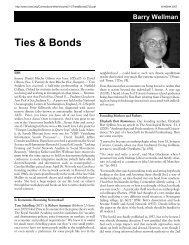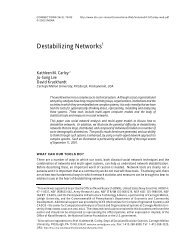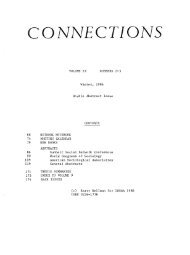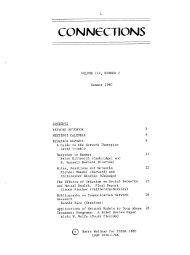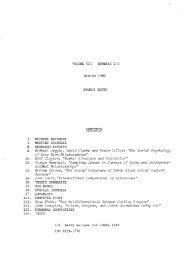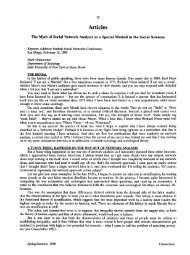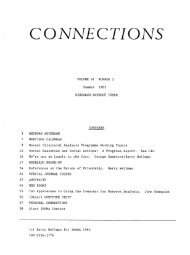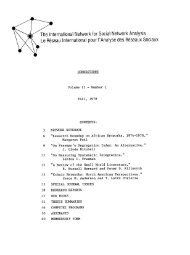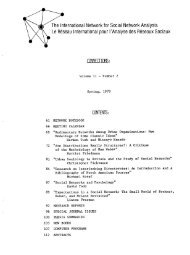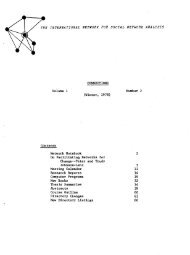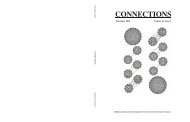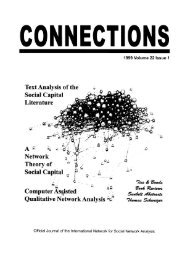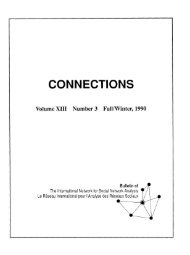Sunbelt XXXI International Network for Social Network ... - INSNA
Sunbelt XXXI International Network for Social Network ... - INSNA
Sunbelt XXXI International Network for Social Network ... - INSNA
You also want an ePaper? Increase the reach of your titles
YUMPU automatically turns print PDFs into web optimized ePapers that Google loves.
Why Do Experts Look Dumb Sometimes?Johnson, Jeffrey C.; Griffith, David; Clough, Lisa; Ambrose, WillKnowledge <strong>Network</strong>sDiffusion, Knowledge Evolution, Climate ChangeTHURS.AM1There is a general expectation that expertise involves a solid grasp and understanding of some knowledge domain. Further, we expect experts to have higherlevels of knowledge domain competency relative to non‐experts. However, caution should be exercised in applying such a common sense generalization whenviewing knowledge and knowledge acquisition as dynamic rather than static. There are conditions under which the foundations of knowledge must change tomeet the influences of shifting realities (e.g., climate change). During these dynamic periods of change, expertise can appear marginalized due to theemergence of new knowledge derived from expert experience. Under such conditions expert knowledge seems to deviate from the status quo or the generallyheld view since by the very nature of their expertise they are the first to comprehend and incorporate new knowledge into their own system of beliefs andunderstanding. Here expert knowledge stands in contrast to conventional views making experts appear dumb. This paper examines expertise among Inupiaqhunters and fishers under conditions of climate change. Expertise, as determined by centrality in reputed knowledge networks, appears to not be related to acompetent understanding of cultural ecological knowledge or the standard shared cultural understanding. However, once various change indicators thatchallenge conventional thought are taken into account, expert knowledge <strong>for</strong>eshadows the dynamic changes to come and, in fact, legitimates reputations ofexpertise.Why Do Organizations <strong>Network</strong> The Way They Do? An Examination Of <strong>Network</strong>ing Patterns Among Self‐benefitting NgosPilny, Andrew; Atouba, YannickOrganizational <strong>Network</strong>sERGM/P*, Inter‐organizational <strong>Network</strong>s, Collective Action, Non‐governmental Organizations, Advocacy OrganizationFRI.PM1Self‐benefitting NGOs primarily exist to serve their own members. Nevertheless, these NGOs still <strong>for</strong>m coalitions and network with one another to gain accessto critical resources, shape public opinion, and lobby on behalf of their members. However, the networking patterns among these organizations have notreceived much attention in the organizational literature. Moreover, while the organizational literature is rich in in<strong>for</strong>mation about why organizations <strong>for</strong>m ties,it is less rich in in<strong>for</strong>mation about why they <strong>for</strong>m those ties the way they do. This study seeks to fill those gaps in the literature. It uses a multi‐theoretical,multi‐level framework and Exponential Random Graph Modeling to examine the endogenous and exogenous influences on the structure of a communicationnetwork among 56 self‐benefitting NGOs. The results indicate that endogenous mechanisms like centralization and transitivity, and exogenous attributes likesubdomain influence, organizational type, media attention, and age influence the probability of communication ties being present. However, the principle ofreciprocity did not influence communication ties, suggesting that the inherent self‐interested nature of self‐benefitting NGOs may impact the logic of theirinterorganizational networks. Furthermore, media attention was highly correlated with perception of organizational influence. Implications <strong>for</strong> future researchare drawn from the results.



